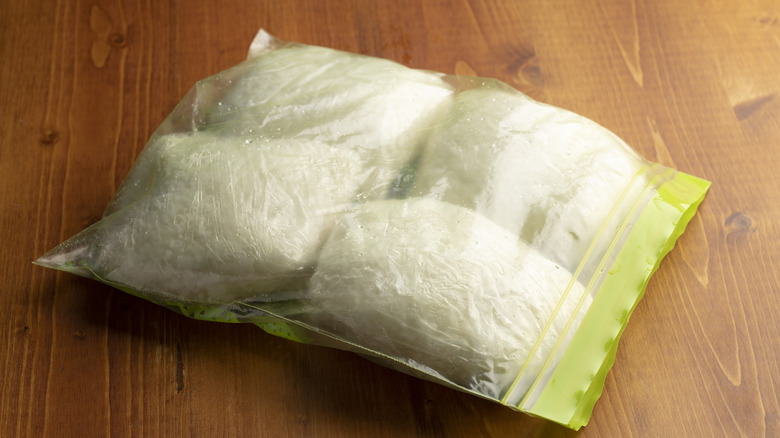The Simple Trick To Ensure Grains Don't Entirely Break Down In Soup
Nothing quite suits winter weather like a warm bowl of soup. With hearty options ranging from hearty minestrone to Mexican rice soup, it isn't just a comforting meal, but also a delicious and filling one. Many of these more satisfying soups, however, contain grains like pasta or rice that can turn soggy after the soup has sat for a few days. It is quite disappointing when this happens since it leaves you with a mealy mess. In order to prevent the breakdown of any grain-based ingredients in your soup, it's best to store them separately from the liquid and add them in with each individual serving.
Grains and grain-based ingredients are excellent at soaking up water. Think about how you cook quinoa or noodles and you will realize just how true this is. Unfortunately, they do not simply stop soaking up water once they are perfectly al dente. Instead, grains left in liquid will continue to absorb that liquid until they disintegrate. This is why we recommend preparing your grain add-ins to the perfect toothsome texture and then keeping them separate until the very moment you are ready to enjoy your soup. This way the grains are not oversaturating themselves in the hours between cooking and eating, and you are guaranteed a soup with a perfect texture every time.
How to store prepared grains
In order to make the most of your cooked grain ingredients, you will want to store them properly for maximum freshness. When it comes to items like rice, quinoa, or farro, it is best to freeze them in single-serving portions for maximum convenience and preservation of flavor and texture. Rice stored in the fridge only lasts a few days, and other grains that may last longer still tend to go mushy after a short while, but will last for months in the freezer. Plus, you can toss the frozen grains directly into the soup and they will thaw as they combine.
If your soup ingredients are more similar to pasta or noodles, it is best to toss the cooked grain in olive oil to prevent sticking and then store it in an airtight container in the fridge. There, it will last for a few days. Freezing cooked pasta and noodles is less than ideal, but it is safe to do so by following the same method as above. To thaw, you can also simply toss the noodles into the soup and wait until soft.

